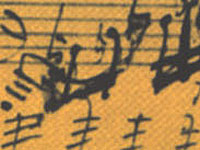|
|||||||||||||||||||||||||||||||||||||||||||||||
| BA Musicianship B - MUSC2311 | |||||||||||||||||||||||||||||||||||||||||||||||

Description 'The BA Musicianship B' course examines the structures and processes of music, aiming to consolidate knowledge of the theory and practice of music. The Harmony component introduces more advanced concepts, especially those aspects of chromatic harmony that form the basis for much music written in the early 19th century, and demonstrates how those concepts are relevant to contemporary music.
The Aural component builds on Musicianship A and complements the Harmony component by studying similar repertoire and compositional processes. It concentrates on three main areas of activity: singing, aural analysis and drills, and provides students with the opportunity to further develop their transcribing skills and general musicianship. Open assessment exercises in composition and perceptual analysis provide the opportunity for an expression of the student’s capacity for enterprise, initiative and creativity. Students develop their understanding of the core repertoire of the Western classical traditions, and jazz, and of historical trends in Western music, through study of a selection of recorded works of Western music literature. Application of theoretical skills is practiced in performance groups, ranging from the University's choir and orchestra to jazz ensembles. Through concert and workshop attendance and documentation, students develop the skills of music criticism, and an understanding of the aesthetics of music in performance. |
|||||||||||||||||||||||||||||||||||||||||||||||


